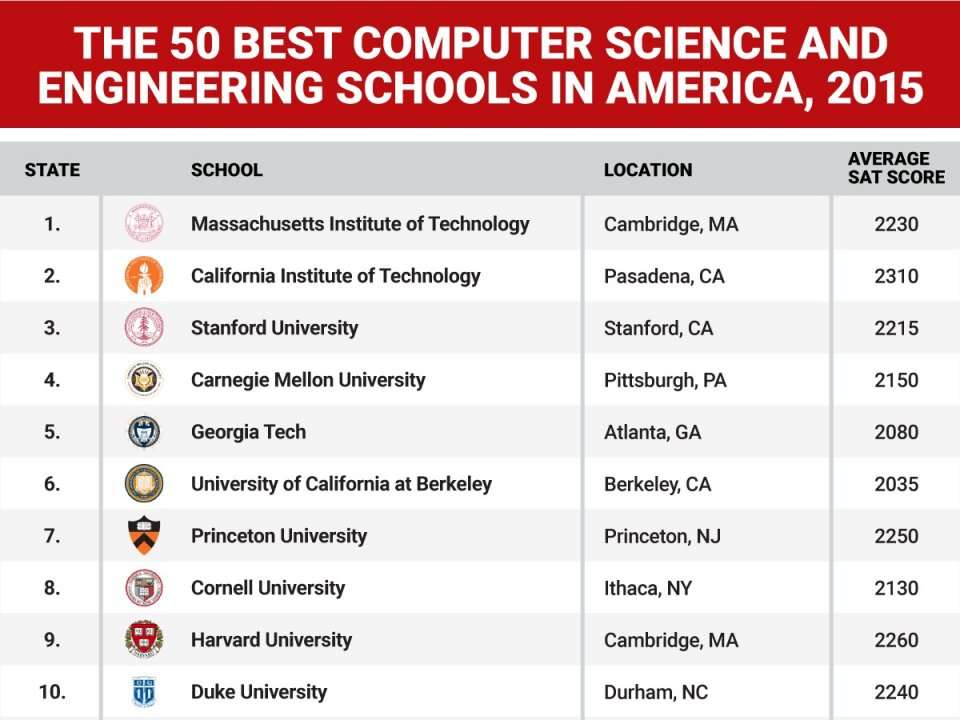Best schools for software engineering are essential for those aspiring to excel in the field. As we delve into the top programs and criteria for selection, a world of opportunities awaits those seeking quality education and career prospects.
Exploring the curriculum, faculty impact, research opportunities, and industry connections, this guide aims to provide a comprehensive overview of what makes these schools stand out in the realm of software engineering.
Researching the Best Schools for Software Engineering

When it comes to pursuing a degree in software engineering, choosing the right school is crucial for your future career prospects. Researching the best schools for software engineering can help you make an informed decision and ensure you receive a quality education. Here are some key points to consider:
Top-Ranked Universities for Software Engineering Programs
- Massachusetts Institute of Technology (MIT)
- Stanford University
- Carnegie Mellon University
- University of California, Berkeley
- University of Illinois Urbana-Champaign
Criteria for Determining the Best Schools
When evaluating schools for software engineering programs, consider the following criteria:
- Reputation and Ranking: Look for schools with a strong reputation and high rankings in computer science and engineering.
- Curriculum and Faculty: Check the curriculum offered, faculty expertise, and research opportunities available.
- Industry Connections: Consider schools with strong ties to industry partners for internships and job placement.
- Graduate Outcomes: Review the success of graduates in securing jobs in the tech industry.
Importance of Accreditation
Accreditation is crucial when selecting a school for software engineering. Accredited programs meet high standards of quality and are recognized by employers and other institutions. Look for schools accredited by organizations such as ABET (Accreditation Board for Engineering and Technology) to ensure you receive a reputable education.
Curriculum and Course Offerings
Software engineering programs typically offer a range of courses designed to provide students with a strong foundation in both theoretical knowledge and practical skills necessary for a career in software development. These courses cover various aspects of software design, development, testing, and maintenance.
Typical Courses Offered in a Software Engineering Program
Software engineering programs usually include courses such as:
- Introduction to Software Engineering
- Algorithm Design and Analysis
- Database Management Systems
- Software Quality Assurance
- Web Development
- Operating Systems
- Software Project Management
Significance of Project-Based Learning in Software Engineering Education
Project-based learning is a fundamental component of software engineering education as it allows students to apply their theoretical knowledge to real-world projects. By working on projects, students learn how to collaborate effectively, problem-solve, and develop practical solutions, mirroring the challenges they will face in the industry.
Comparison of Curriculum Structures of Different Universities Specializing in Software Engineering
| University | Curriculum Structure |
|---|---|
| University A | Emphasizes hands-on coding projects and industry internships |
| University B | Offers a focus on software architecture and design principles |
| University C | Includes courses on artificial intelligence and machine learning in software development |
Faculty and Research Opportunities: Best Schools For Software Engineering

Faculty members play a crucial role in shaping a software engineering program by providing expertise, guidance, and mentorship to students. Research opportunities in software engineering are essential for students to gain practical experience, explore new technologies, and contribute to advancements in the field. Let’s delve into the significance of experienced faculty and research opportunities in software engineering programs.
Role of Experienced Faculty
Experienced faculty members bring a wealth of knowledge and industry experience to software engineering programs. They not only impart theoretical concepts but also offer practical insights, real-world examples, and mentorship to students. Faculty members guide students in developing critical thinking skills, problem-solving abilities, and technical expertise essential for a successful career in software engineering.
Importance of Research Opportunities
Research opportunities in software engineering allow students to engage in hands-on projects, collaborate with faculty members, and contribute to cutting-edge research initiatives. By participating in research projects, students can explore emerging technologies, tackle complex problems, and gain valuable experience in experimental design, data analysis, and project management. Research opportunities also foster creativity, innovation, and collaboration among students and faculty members.
Examples of Groundbreaking Research Projects
– Prof. Smith led a research project on artificial intelligence applications in software testing, resulting in a breakthrough approach to automated test generation.
– Dr. Johnson collaborated with industry partners to develop a secure software development framework, addressing cybersecurity challenges in software engineering practices.
– The research team at XYZ University pioneered a project on blockchain technology for decentralized applications, leading to the development of a novel consensus algorithm.
Research opportunities led by faculty members not only enhance the academic experience but also contribute to the advancement of software engineering knowledge and practices. Students benefit from hands-on research experiences, exposure to cutting-edge technologies, and mentorship from industry experts, preparing them for successful careers in the field.
Internships, Co-ops, and Industry Connections

Internships and co-op programs play a crucial role in a software engineering education by providing students with valuable hands-on experience in real-world settings. These opportunities allow students to apply their theoretical knowledge to practical situations, gain exposure to industry practices, and develop essential skills that are highly sought after by employers.
Value of Internships and Co-ops
Internships and co-op programs offer students the chance to work on actual projects, collaborate with industry professionals, and build a network of contacts within the field. Through these experiences, students can enhance their problem-solving abilities, communication skills, and overall understanding of the software development process.
- Gain practical experience in a professional setting.
- Apply theoretical knowledge to real-world scenarios.
- Develop essential skills and competencies required in the industry.
- Build a network of contacts and potential mentors.
Industry Connections
Strong industry connections benefit students in software engineering programs by providing access to valuable resources, opportunities for collaboration, and potential job placements upon graduation. Schools with established relationships with industry partners can offer students a variety of benefits, including internships, research opportunities, and networking events.
- Access to the latest industry trends and technologies.
- Potential for job placements and career opportunities.
- Mentorship and guidance from industry professionals.
- Collaboration on research projects and initiatives.
Companies that Recruit Graduates, Best schools for software engineering
Top schools for software engineering often have partnerships with leading companies in the tech industry that actively recruit graduates. Some of these companies include:
- Microsoft
- Amazon
- Apple
Ending Remarks
In conclusion, the best schools for software engineering offer a blend of academic excellence, practical learning, and industry relevance. By choosing a reputable institution with strong ties to the tech industry, students can pave the way for a successful career in software engineering.
